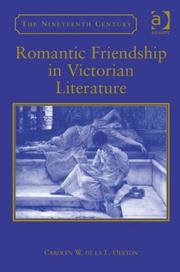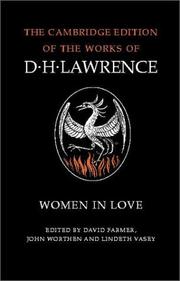| Listing 1 - 10 of 10 |
Sort by
|
Book
ISBN: 9781137305183 Year: 2014 Publisher: New York Palgrave Macmillan
Abstract | Keywords | Export | Availability | Bookmark
 Loading...
Loading...Choose an application
- Reference Manager
- EndNote
- RefWorks (Direct export to RefWorks)

ISBN: 0226071804 Year: 2003 Publisher: Chicago (Ill.) : University of Chicago press,
Abstract | Keywords | Export | Availability | Bookmark
 Loading...
Loading...Choose an application
- Reference Manager
- EndNote
- RefWorks (Direct export to RefWorks)
Male friendship --- Male homosexuality --- History. --- Homosexuality, Male --- Homosexuality --- Men --- Friendship between men --- Friendship in men --- Mens' friendship --- Friendship --- History --- Sexual behavior --- England --- Homosexualité masculine --- Bromance (Male friendship) --- Men's friendship
Book
ISBN: 9780521192910 0521192919 Year: 2011 Volume: 33 Publisher: Cambridge Cambridge University Press
Abstract | Keywords | Export | Availability | Bookmark
 Loading...
Loading...Choose an application
- Reference Manager
- EndNote
- RefWorks (Direct export to RefWorks)
"The literature on trench journalism is well-established for Britain and France during the First World War, but this book is the first systematic study in English of German soldier newspapers as a representation of daily life and beliefs on the front. Printed by and for soldiers at or near the front line these newspapers were read by millions of 'ordinary soldiers.' They reveal an elaborately defined understanding of comradeship and duty. The war of aggression, the prolonged occupation on both fronts, and the hostility of the local populations were justified through a powerful image of manly comradeship. The belief among many Germans was that they were good gentlemen, fighting a just war and bringing civilization to backward populations. This comparative study includes French, British, Australian, and Canadian newspapers and sheds new light on the views of combatants on both sides of the line"-- "Why do soldiers fight? Why did German soldiers follow orders throughout a seemingly endless war from 1914 to 1918? Did German soldiers really believe that they were waging a 'war of defence' while occupying foreign soil and populations? Were German soldiers atavistic nationalists or bitter pacifists? In other words, were these men perpetrators or victims? What was the postwar legacy of these soldiers' experiences for the dark events to come? Every major study of German soldiers in the First World War (and ninety plus years has produced a vast library) attempts to tackle most, sometimes all, of these questions. This book is no exception. I posit partial answers to all of these queries through my analysis of German soldier newspapers, printed at or near the front, by and for soldiers. I will show that this incredibly popular medium, bought and read by millions, provided 'ordinary soldiers' with a language of manly justification for the aggressive and occupational practices of the German army. The soldier newspapers largely bypassed the popular nationalist discourse, a troublesome category in the still 'young' Germany with its many 'ethnic' divisions and decentralised mass culture, and instead focused upon the ideal of comradeship. This comradeship involved both that among fellow soldiers with its associated concepts of what it meant to be a 'man,' as well as the idea of the German comrade, an honest, good gentleman, as a participant in an occupying, or 'colonizing,' force"--
Fellowship --- German newspapers --- Journalism, Military --- Male friendship --- Soldiers --- World War, 1914-1918 --- History --- Attitudes --- Social conditions --- Press coverage --- Social aspects --- Germany. --- Military life
Book
ISBN: 0140430180 9780140430189 Year: 1985 Publisher: Harmondsworth: Penguin books,
Abstract | Keywords | Export | Availability | Bookmark
 Loading...
Loading...Choose an application
- Reference Manager
- EndNote
- RefWorks (Direct export to RefWorks)
Finn, Huckleberry (Fictitious character) --- Runaway children --- Male friendship --- Fugitive slaves --- Race relations --- Boys --- Readers. --- Twain, Mark, --- Adventures of Huckleberry Finn --- --Twain, Mark --- Mississippi River --- Missouri --- Engels --- Huckleberry Finn --- Literatuur --- Twain Mark --- American literature --- Finn, Huckleberry (Fictitious character) - Fiction. --- Runaway children - Fiction. --- Male friendship - Fiction. --- Fugitive slaves - Fiction. --- Race relations - Fiction. --- Boys - Fiction. --- Twain, Mark --- Twain, Mark, 1835-1910 --- Mississippi River - Fiction. --- Missouri - Fiction.

ISBN: 0801854334 Year: 1997 Publisher: Baltimore, Md. ; London Johns Hopkins University Press
Abstract | Keywords | Export | Availability | Bookmark
 Loading...
Loading...Choose an application
- Reference Manager
- EndNote
- RefWorks (Direct export to RefWorks)
Men in literature --- Male friendship in literature --- Gray, Thomas, - 1716-1771 - Criticism and interpretation. --- Latin poetry - Translations into English - History and criticism. --- Homosexuality and literature - England - History - 18th century. --- Love poetry, English - Men authors - History and criticism. --- Friendship - England - History - 18th century. --- Poets, English - 18th century - Biography. --- Male friendship in literature.
Book
ISBN: 9780199558155 0199558159 0191721344 0191567884 9786612104121 1282104128 0199671176 Year: 2009 Publisher: Oxford [etc.] Oxford University Press
Abstract | Keywords | Export | Availability | Bookmark
 Loading...
Loading...Choose an application
- Reference Manager
- EndNote
- RefWorks (Direct export to RefWorks)
Book
ISBN: 2070759148 9782070759149 Year: 2002 Publisher: Paris: Gallimard,
Abstract | Keywords | Export | Availability | Bookmark
 Loading...
Loading...Choose an application
- Reference Manager
- EndNote
- RefWorks (Direct export to RefWorks)
Fiction [Psychological ] --- Psychological fiction --- Psychologische roman --- Roman [Pssychologische ] --- Roman psychologique --- Political science teachers --- Fiction --- AIDS (Disease) --- Patients --- Americans --- France --- College teachers --- Male friendship --- Paris (France) --- Millionaires --- Middle West --- Biographers

ISBN: 9780754658696 0754658694 9781315606934 9781317061526 9781317061533 9781138259621 Year: 2007 Volume: *109 Publisher: Aldershot [etc.] Ashgate
Abstract | Keywords | Export | Availability | Bookmark
 Loading...
Loading...Choose an application
- Reference Manager
- EndNote
- RefWorks (Direct export to RefWorks)

ISBN: 0521280419 0521235650 9780521280419 Year: 1987 Publisher: Cambridge: Cambridge university press,
Abstract | Keywords | Export | Availability | Bookmark
 Loading...
Loading...Choose an application
- Reference Manager
- EndNote
- RefWorks (Direct export to RefWorks)
Coal mines and mining --- Male friendship --- Sisters --- Women --- Fiction. --- -Male friendship --- -Sisters --- Friendship between men --- Friendship in men --- Mens' friendship --- Coal mining --- Collieries --- Mines and mineral resources --- Midlands (England) --- -Coal mines and mining --- -Interpersonal relations --- -Human relations --- Anglii︠a︡ --- Inghilterra --- Inglaterra --- Anglija --- English literature --- Fiction --- Interpersonal relations --- Coal miners --- England --- Social conditions --- Coal mines and mining - England - Fiction --- Interpersonal relations - Fiction --- Coal miners - England - Fiction --- England - Social conditions - Fiction

ISBN: 0300083327 9786611722845 1281722847 0300133677 9780300133677 9781281722843 9780300083323 Year: 2001 Publisher: London New Haven Yale University Press
Abstract | Keywords | Export | Availability | Bookmark
 Loading...
Loading...Choose an application
- Reference Manager
- EndNote
- RefWorks (Direct export to RefWorks)
"A friend in history," Henry David Thoreau once wrote, "looks like some premature soul." And in the history of friendship in early America, Caleb Crain sees the soul of the nation's literature. In a sensitive analysis that weaves together literary criticism and historical narrative, Crain describes the strong friendships between men that supported and inspired some of America's greatest writing--the Gothic novels of Charles Brockden Brown, the essays of Ralph Waldo Emerson, and the novels of Herman Melville. He traces the genealogy of these friendships through a series of stories. A dapper English spy inspires a Quaker boy to run away from home. Three Philadelphia gentlemen conduct a romance through diaries and letters in the 1780's. Flighty teenager Charles Brockden Brown metamorphoses into a horror novelist by treating his friends as his literary guinea pigs. Emerson exchanges glances with a Harvard classmate but sacrifices his crush on the altar of literature--a decision Margaret Fuller invites him to reconsider two decades later. Throughout this engaging book, Crain demonstrates the many ways in which the struggle to commit feelings to paper informed the shape and texture of American literature.
Amitié entre hommes dans la littérature --- Hommes dans la littérature --- Male friendship in literature --- Mannen in de literatuur --- Men in literature --- Sympathie dans la littérature --- Sympathie in de literatuur --- Sympathy in literature --- Vriendschap tussen mannen in de literatuur --- American literature --- Thematology --- anno 1800-1899 --- Male authors --- History and criticism --- 19th century --- 1783-1850 --- Male friendship --- United States --- History --- Brown, Charles Brockden --- Characters --- Men --- Emerson, Ralph Waldo --- Mifflin, John Fishbourne --- Gibson, James --- Brown, Charles Brockden, - 1771-1810 - Characters - Men. --- Emerson, Ralph Waldo, - 1803-1882. - Friendship. --- Men in literature. --- Male friendship in literature. --- Sympathy in literature. --- Friendship between men --- Friendship in men --- Mens' friendship --- Friendship --- English literature --- Agrarians (Group of writers) --- History and criticism. --- History. --- Brown, Charles Brockden, --- Emerson, Ralph Waldo, --- Brown, C. B. --- Brown, Brockden, --- C. B. B. --- B., C. B. --- Poplicola, --- Author of An address to the government of the United States, on the cession of Louisiana, --- Address to the government of the United States, on the cession of Louisiana, Author of, --- French counsellor of state, --- Men. --- Bromance (Male friendship) --- Men's friendship
| Listing 1 - 10 of 10 |
Sort by
|

 Search
Search Feedback
Feedback About UniCat
About UniCat  Help
Help News
News